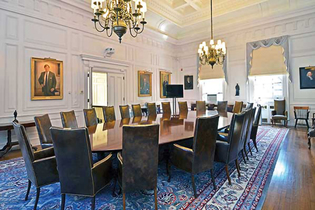 loading
loading
Light & VerityNew group seeks changes at YaleFight for Yale's Future is focused on free expression and governance issues.  Michael MarslandThe Corporation Room in Woodbridge Hall, where Yale’s trustees meet. View full imageIn May 1974, Yale faculty voted to conduct a formal inquiry into “the condition of free expression, peaceful dissent, mutual respect, and tolerance” on campus. A commission chaired by professor C. Vann Woodward was assigned to the task. By year’s end, they had released the Woodward Report, which stressed that the freedom “to think the unthinkable, discuss the unmentionable, and challenge the unchallengeable” was crucial to intellectual inquiry. Yale adopted the report in 1975 as its standard for its free-expression policy. But the strength of this commitment is now under question by Fight for Yale’s Future, a group that says it intends to “restore light and truth at Yale.” A fortified defense of free speech and inquiry is one of four issues targeted by Fight for Yale’s Future, which is supported by the William F. Buckley Jr. Program at Yale. The organization is petitioning Yale to reaffirm the principles of the Woodward Report, and has so far gathered more than 800 signatures from the Yale community. Through ads in this magazine and on social media, Fight for Yale’s Future is also pushing for a more ideologically diverse and open climate on campus. A 2016 Yale Daily News survey found that nearly 95 percent of conservative undergraduates considered their views unwelcome on campus. Two-thirds of liberal students validated this belief, admitting that they, too, think Yale does not welcome conservative students. Fight for Yale’s Future has put forward three other central areas of concern besides free speech and inquiry: academic excellence, “ballooning bureaucracy,” and governance. This last issue involves a perceived lack of transparency and accountability among Yale leadership, exemplified most recently by the controversial decision to eliminate the petition process for alumni interested in a seat on the Board of Trustees. (See “After Election, Trustees End Petition Campaigns,” July/August 2021.) “We saw a major need when the Yale Corporation eliminated the petition process for the alumni fellow election in 2021,” says Lauren Noble ’11, the founder and executive director of the Buckley Program and a representative of Fight for Yale’s Future. “The Yale Corporation made the decision to disenfranchise alumni very recently and behind closed doors.” In response to a request for comment about the issues raised by the organization, university spokesperson Karen Peart cited a message by trustee Catharine Bond Hill ’85PhD that explained the decision on petition candidacies as a response to the politicization of recent campaigns. “At the heart of the matter,” wrote Hill, “is the vital distinction between an elected representative of a cause or movement and a person elected without any agenda other than to bring independent judgment to the varied and complex issues facing the university.” On the matter of free expression, Peart noted that students are provided with information about Yale’s free-expression policies. “I am proud that Yale’s board has a greater degree of alumni enfranchisement and representation than on the boards of our peer institutions,” says Weili Cheng ’77, executive director of the Yale Alumni Association, noting that 6 of the board’s 16 trustees are elected by alumni, and that the candidates are nominated by alumni and chosen by a committee of alumni volunteers. “We don’t expect this restoration of light and truth to happen overnight,” Noble says. “There’s certainly a long road ahead.”
The comment period has expired.
|
|